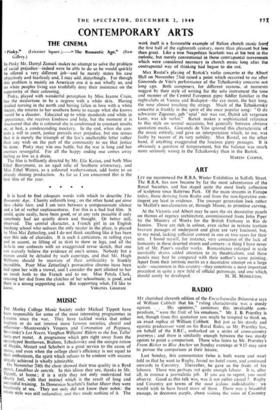CONTEMPORARY ARTS
THE CINEMA
Pinky." (Leicester Square.)—"The Romantic Age." (New Gallery.) IN Pinky Mr. Darryl Zanuck makes no attempt to solve the problem of racial prejudice—indeed were he able to do so he would quickly be offered a very different job—and he merely states his case objectively and fearlessly and, I may add, disturbingly. For though this problem is mainly an American one it is not wholly so, and no white peoples living can truthfully deny their insistence on the superiority of their colouring. Pinky, played with wonderful perception by Miss Jeanne Crain, has the misfortune to be a negress with a white skin. Having studied nursing in the north and having fallen in love with a white doctor, she returns to her southern home to escape what she knows would be a disaster. Educated up to white standards and white in ippearance, she receives kindness and help, but the moment it is discovered that she is coloured she is condemned to constant insults or, at best, a condescending mockery. In the end, when she con- tests a will in court, justice prevails over prejudice, but one senses that it is merely the triumph of the law's unalterable letter rather than any wish on the part of the community to see that justice be done. Pinky may win one battle, but the war is long and her enemies revengeful. For all the happy ending one comes away feeling as low as a drain.
The film is brilliantly directed by'Mr. Elia Kazan, and both Miss Ethel Barrymore, as an aged relic of Southern aristocracy, and Miss Ethel Waters, as a coloured washerwoman, add lustre to an already shining production. As far as lam concerned this is the best film of the year.
It is hard to find adequate words with which to describe The Romantic Age. Charity suffercth long ; on the other hand qui ainte Bien chatie bien. and I am torn between a compassionate silence and a lot of verbal unpleasantness. For this is a bad bad film. It could, quite easily, have been good, or at any rate passable if only somebody had sat quietly down and thought. Or better still, observed. The central character, a French girl in an English finishing school who seduces the only master in the place, is played by Miss Mai Zettcrling, and I do not think anything like it has been seen this side of charades. It is such a caricature, ze rolling eyes and ze accent, ze lifting of ze skirt to show ze legs, and all the fa-la-la one codnects with an exaggerated revue sketch, that one can scarcely believe the evidence of one's senses. Nobody but a moron could be deluded by such caperings, and that Mr. Hugh Williams should be unaware of their artificiality is frankly incredible. Poor Miss Zetterling's provocative charms have been laid upon her with a trowel, and I consider the part allotted to her an insult both to the French and to me. Miss Petula Clark, rescuing her dad from the clutches of her schoolmate, is good, and there is a strong supporting cast. But supporting what, I'd like to


































 Previous page
Previous page